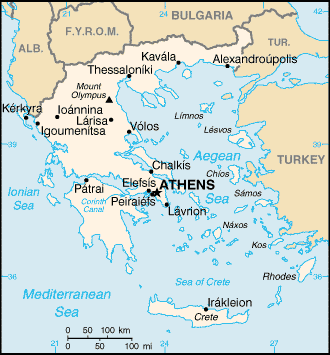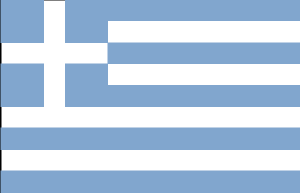
|
Greece
Background:
Greece achieved its independence from the Ottoman Empire in 1829. During the
second half of the 19th century and the first half of the 20th century, it
gradually added neighboring islands and territories with Greek-speaking
populations. Following the defeat of Communist rebels in 1949, Greece joined
NATO in 1952. A military dictatorship, which in 1967 suspended many political
liberties and forced the king to flee the country, lasted seven years.
Democratic elections in 1974 and a referendum created a parliamentary republic
and abolished the monarchy; Greece joined the European Community or EC in 1981
(which became the EU in 1992).
Location:
Southern Europe, bordering the Aegean Sea, Ionian Sea, and the Mediterranean
Sea, between Albania and Turkey.
Area: Total: 131,940 sq km, water: 1,140 sq km, land: 130,800 sq km.
Area - comparative: Slightly smaller than Alabama.
Land boundaries: Total: 1,228 km, border countries: Albania 282 km, Bulgaria
494 km, Turkey 206 km, The Former Yugoslav Republic of Macedonia 246 km.
Coastline: 13,676 km.
Climate and Terrain:
Climate: Temperate; mild, wet winters; hot, dry summers.
Terrain: Mostly mountains with ranges extending into the sea as peninsulas or
chains of islands.
Natural resources: Bauxite, lignite, magnesite, petroleum, marble, hydropower
potential.
People:
Population: 10,645,343.
Ethnic groups: Greek 98%, other 2% note: the Greek Government states there are
no ethnic divisions in Greece.
Religions: Greek Orthodox 98%, Muslim 1.3%, other 0.7%.
Languages: Greek 99% (official), English, French.
Government:
Government type: Parliamentary republic; monarchy rejected by referendum 8
December 1974.
Capital: Athens.
Independence: 1829 (from the Ottoman Empire).
Economy overview:
Greece has a mixed capitalist economy with the public sector accounting for
about half of GDP. Tourism is a key industry, providing a large portion of GDP
and foreign exchange earnings. Greece is a major beneficiary of EU aid, equal
to about 3.3% of GDP. The economy has improved steadily over the last few
years, as the government tightened policy in the run-up to Greece's entry into
the EU's Economic and Monetary Union (EMU) on 1 January 2001. Economic growth
is forecast at 3%-3.5% in 2002.
GDP - composition by sector: Agriculture: 8.3%, industry: 27.3%, services:
64.4%.
Statistics:
Telephones - main lines in use: 5.431 million.
Telephones - mobile cellular: 937,700.
Radio broadcast stations: AM 26, FM 88, shortwave 4.
Radios: 5.02 million.
Television broadcast stations: 36 (plus 1,341 low-power repeaters).
Televisions: 2.54 million.
Internet users: 1.33 million.
Railways: Total: 2,571 km.
Highways: Total: 117,000 km, paved: 107,406 km, unpaved: 9,594 km.
Airports: 79,
with paved runways: 65,
with unpaved runways: 14.
Heliports: 4.
Return to Visiting Locations
|

